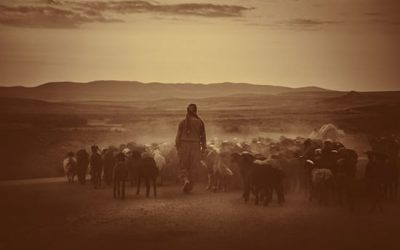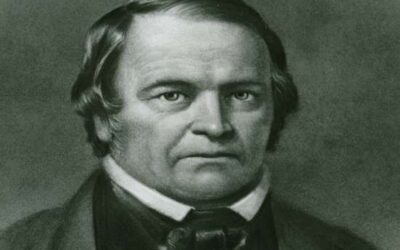You may have an Adventist friend who is vegetarian, or maybe you’re attending a Seventh-day Adventist Church for the first time and notice the potluck doesn’t have any meat.
This isn’t unusual in Adventism.
In fact, about 36% of Adventists are lacto-ovo vegetarians, meaning they don’t eat meat or fish but may eat eggs or dairy. Another 16% eat fish or meat occasionally, according to Adventist Health Studies done by Loma Linda University.1
At any rate, perhaps you’re wondering what their reasons are.
Vegetarianism is popular within Seventh-day Adventism because we value personal health and believe that a vegetarian diet is a good way to care for our bodies, maintain wellness, and honor God (1 Corinthians 6:20; 10:31; Romans 12:1-2). God originally gave human beings a vegetarian diet, according to Genesis 1:29, and today, research is increasingly showing the benefits of a diet low in animal products and high in fruits, vegetables, grains, and nuts.
However, the desire to serve God in this way is not meant to be a means to become “holier” or to somehow earn salvation. Adventists aim to live this way as a response to what God has done for us as human beings.
To further explain why vegetarianism is popular among Adventists, we’ll look at:
To start off, let’s turn to the Bible’s insights.
What the Bible says about a vegetarian diet

Photo on Pexel
When we read about Adam and Eve living in the Garden of Eden, we find that God’s original plan for humanity included a plant-based diet. He told the new humans:
“See, I have given you every herb that yields seed which is on the face of all the earth, and every tree whose fruit yields seed; to you it shall be for food” (Genesis 1:29, NKJV).
And it makes sense that God would have provided Adam and Eve with food that would sustainably grow for them. And in a perfect world without death of any kind, the slaughter of animals would’ve been incomprehensible.
It wasn’t until after the flood that God directly permitted humans to eat meat (Genesis 9:3-4). After the flood, the earth’s vegetation had been destroyed and would take time to grow back and be able to provide food once again.
For this reason, God instructed Noah to bring on the ark seven of every “clean” animal (Genesis 7:2-3).
(Leviticus 11 and Deuteronomy 14 explain in more detail what is considered “clean” meat.)
After the time of the flood, most people throughout the rest of the Bible ate meat. It was a necessity in a society where fresh food wasn’t always easy to come by and couldn’t be preserved for long periods of time. So to meet their dietary needs, they hunted animals to provide for their families.
In some places today, too, being a vegetarian may not be as practical or provide enough necessary nutrition due to a lack of vegetarian options. But many Adventists who live in places with easy access to fruits, vegetables, grains, and legumes year-round choose a vegetarian diet to eat as closely to the original diet as possible.
And modern science continues to show the benefits of eating this way, as we’ll look at in the next section.
What science says about a vegetarian diet
A balanced vegetarian diet, high in fruits, nuts, vegetables, and legumes, has numerous benefits for physical health, as revealed by research done over the past 20 years. Eating vegetarian is associated with:2
- Lower blood pressure, LDL cholesterol, and BMI
- Lower risk of heart disease
- Lower risk of cancer
- Lower risk of type 2 diabetes
- Lower risk of obesity3
Adventist Health Studies, conducted by Loma Linda University, have looked at the connection between lifestyle and health in Seventh-day Adventists. Adventist Health Study-1 surveyed more than 34,000 individuals over a 14-year period and found significant links between a high-fiber vegetarian diet and lower risks of cancer.
Adventist Health Study-2, which involved over 94,000 respondents, provided even more insight. It found that Adventists who did not eat meat had a smaller chance of developing type 2 diabetes.4
Another analysis of the data from the Adventist Health Study-2 found that Adventists who got protein from foods like lentils, nuts, and seeds had a lower risk of cardiovascular death than those who got protein from meat.5
The longevity of Adventists also speaks for their lifestyle and way of eating.
Researchers found that Adventist men in California who were vegetarian lived almost 10 years longer than their counterparts.6
In fact, Loma Linda, California, an area with a high concentration of Adventists, drew the attention of researcher Dan Buettner when he was studying “Blue Zones,” or places in the world where people live significantly longer (often to over 100 years old) and healthier lives than the average population.
He labeled Loma Linda as one of those Blue Zones because of the many Seventh-day Adventists there who are health conscious and eat a vegetarian or vegan diet.
Though diet is not the only factor for health and longevity in the Blue Zones, it’s a significant one. Most Blue Zone residents eat 95% vegetarian, consuming meat rarely and focusing on unprocessed, whole foods like legumes, vegetables, fruits, nuts, and whole grains. If they do eat meat, it’s generally lean meat, like fish, and little to no red meat.7
The health benefits of being vegetarian coincide with Adventists’ desire to honor God by being good stewards of the bodies God gave us, striving to maintain well-being in as many ways as possible. Let’s look at that next.
Spiritual reasons Adventists choose vegetarianism

Photo by Pablo Merchán Montes on Unsplash
Alongside striving toward eco-friendliness and kindness to animals, Adventists find healthy living to be a good way to serve and honor God to the best of our abilities. One passage we turn to in Scripture is 1 Corinthians 6:19-20:
“Or do you not know that your body is the temple of the Holy Spirit who is in you, whom you have from God, and you are not your own? For you were bought at a price; therefore glorify God in your body and in your spirit, which are God’s” (NKJV).
Because our bodies are “the temple of the Holy Spirit”—the means through which God speaks to our minds—we seek to care for our bodies, mentally, spiritually, and physically. So it makes sense for good health to be a priority.
Eating healthy is one aspect of that. It helps to keep our minds clear, making it easier to grow closer to God and serve Him more effectively.
The apostle Paul sums up this idea of honoring God in his letter to the Corinthian church:
“Therefore, whether you eat or drink, or whatever you do, do all to the glory of God” (1 Corinthians 10:31, NKJV).
And that’s really what it’s all about—serving God and orienting our lives toward Him. Making healthy choices supports that ultimate desire.
Choose an Online Bible Study
Want to keep learning? Find out more about Jesus, humanity, the plan of salvation, and how God loves you enough to sacrifice everything, just to give you a chance to choose Him.
Sometimes it can be hard to know where to start, that’s why we offer free, user-friendly, online Bible study options you can do anytime, anywhere, and at your own pace.
This online Bible school will take you through the major themes of Scripture, breaking down the Bible’s complex concepts into bite-sized pieces, which can lead you toward the answers of life’s more challenging questions.
Related Articles
- “Adventist Health Study–2,” Loma Linda University. [↵]
- “Becoming a vegetarian,” Harvard Health Publishing. [↵]
- “Plant-based nutrition: Exploring Health Benefits for Atherosclerosis, Chronic Diseases, and Metabolic Syndrome—A Comprehensive Review,” Nutrients, July 2023. [↵]
- Sabaté, Joan, et al. “Unscrambling the relations of egg and meat consumption with type 2 diabetes risk,” National Library of Medicine, November 1, 2018. [↵]
- Tharrey, Marion, et al. “Patterns of plant and animal protein intake are strongly associated with cardiovascular mortality: the Adventist Health Study–2 cohort,” National Library of Medicine, October 1, 2018. [↵]
- “Findings for Longevity,” Loma Linda University Health. [↵]
- “Top Reasons Why Blue Zones are the Healthiest Places to Live,” Plant Whys. [↵]
More Answers
Why do Adventists Emphasize Religious Liberty?
Adventists see religious liberty as an essential human right. After all, God endowed humanity with freedom of choice from the very beginning. So we believe it’s best for governments to also support their citizens’ rights to worship based on their convictions.
All about Adventist Elementary Schools
The Seventh-day Adventist Church operates the largest Protestant education system in the world. A big part of this system is our K-8 elementary schools, or primary schools, as they’re known in other parts of the world.
What Are Pathfinder and Adventurer Clubs?
Like the boy or girl scouts, Pathfinders and Adventurers learn about nature and life skills. But what makes these clubs special is their purpose to bring young people closer to Jesus.
13th Sabbath Offering: What It Is and Why It Matters
While the previous 12 Sabbaths of the quarter feature an established Adventist ministry and its current giving needs, the 13th is a rotating spot reserved for current mission projects.
A Look at Adventist Colleges and Universities
On the outside, Seventh-day Adventist universities may not look much different than other college campuses. But the real differences are beneath the surface.
What Is ASI (Adventist-Laymen’s Services and Industries)?
ASI, which stands for Adventist-laymen’s Services and Industries, is a membership-based organization that provides support for Seventh-day Adventist laypeople (Adventist professionals who aren’t pastors).
What Are Adventist Evangelistic Meetings?
The Seventh-day Adventist Church puts a huge emphasis on sharing the gospel through evangelism, or sharing the gospel through preaching, teaching, and testimony. One of the ways we accomplish this is by organizing public events called evangelistic meetings.
Rest and Reconnection: What It Really Means to Keep the Sabbath
The Bible tells us that we keep the Sabbath by avoiding work. God made this law because he knew it would strengthen us and bring us joy, as well as give us time to reconnect with Him and recharge from our busy lives.
The Parables of Jesus: What They Teach Us About Life
Have you ever been on the verge of sleep in the middle of a long lecture or sermon when suddenly the speaker takes a turn and begins to tell a story?
The Story of Moses in the Bible: What His Life Teaches Us
A baby on death row, an outcast prince, a humble shepherd, and an unlikely deliverer. All these titles describe the individual that led Israel out of slavery in Egypt to the borders of the Promised Land.
Christian Summer Camps—A Cherished Adventist Ministry
School’s out, the sun’s shining, and your kids are thrilled to have the summer ahead of them. Then three days in, you hear, “I’m bored…”
Who was J.N. Andrews and How Did He Contribute to Adventism?
John Nevins Andrews (1829–1883) was an influential leader in the early days of the Seventh-day Adventist Church. He was a Bible scholar who helped shape several Adventist beliefs and juggled many roles in the Church. Most notably, he was the first official missionary for the Adventist Church outside North America.
The 42 Kings (and 1 Queen) of Israel and Judah in the Bible
Conspiracies, royal scandals, dictatorships—history is full of them. And Bible history is no different when we stop to look at the kings of ancient Israel in the Old Testament.
Do Adventists Have Their Own Bible?
Adventists have some unique beliefs—you might be able to name some of them right now. The seventh-day Sabbath. Death as a sleep. Hell as nonexistence.
What Is Vespers?
Friday rolls around, and you’re spending time with your Adventist friends or relatives when they mention they’re going to vespers tonight.
The Creation of the World: What the Bible Really Says
When we think about the biblical Creation story, we think of just that: the world being created by the Creator. And while God’s creation of the world is marvelous and miraculous in its own right, it’s about far more than the sudden appearance of plants, animals, and humans.
What’s the History of the Bible?
The Bible is the number one bestseller in the world of all time.1 It’s translated into thousands of languages, read by people of all ages and backgrounds.
Adventist Pastors
What is the role of a pastor in the Adventist Church? The position itself, at least as far as a local congregation is concerned, is not much different from that of pastors in other protestant denominations.
The Leadership Structure of the Seventh-day Adventist Church
The Seventh-day Adventist Church has a representative form of structure that connects its 90,000-plus congregations across the globe and gives its members a part in decision-making. Though the Church was incorporated in 1863, this system came about during the church’s reorganization from 1901 to 1903. It includes four levels of organization.
What Does “Adventist” Mean
Seventh-day Adventists are a Protestant Christian denomination who hold to the biblical seventh-day Sabbath. From this belief, they get the first part of their name.
Who Were the Israelites in the Bible?
The Israelites in the Bible, also known as the children of Israel or ancient Israel, were a nation God called to represent Him to the world. As recorded in the book of Exodus, He delivered them from slavery in Egypt under Moses’s leadership and brought them to the Promised Land of Canaan (located in a similar area to present-day Israel).
Everything You Need to Know About Sabbath Meals
For Seventh-day Adventists, sharing a Sabbath meal with friends and family is one of the most special and memorable parts of the Sabbath.
William Miller
William Miller was a farmer who began a nationwide religious movement surrounding the Second Coming of Jesus. Learn about the life and legacy of this Christian pioneer.
What We Can Learn from the Life of Joshua
Joshua was an iconic leader in the Old Testament of the Bible. As a successor to Moses, he was both a humble servant of God and a strong warrior. God called Him to lead the nation of Israel to take possession of Canaan, the Promised Land—a task he took on with faith and courage.
Didn’t find your answer? Ask us!
We understand your concern of having questions but not knowing who to ask—we’ve felt it ourselves. When you’re ready to learn more about Adventists, send us a question! We know a thing or two about Adventists.
































